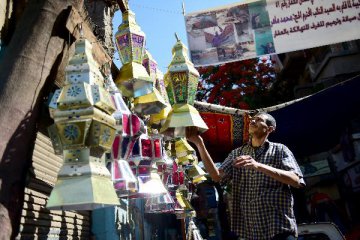Egypt plans to establish a free economic zone in the Red Sea coastal town of Nuweiba in South Sinai province east of the capital Cairo, the Egyptian investment minister said in an official statement Saturday.
"The government has decided to establish the free zone as part of a comprehensive development plan for Sinai that involves pumping domestic and Arab investments," said Sahar Nasr, Egypt's minister of Investment and International Cooperation.
She pointed out that the establishment of Nuweiba free economic zone would bring the number of free zones in the country to 11, noting that free zones in Egypt constitute to 24 percent of the country's overall exports and provide up to 1 million direct and indirect job opportunities.
The minister added that investors in the zone would benefit from a 50 percent tax exemption from the investment cost of their projects for three years subject to renewal after government approval.
South Sinai Governor Khaled Fouda said in a press conference earlier on Saturday, held at the cabinet headquarters in Cairo, that the free zone would be established in about two years.
"The feasibility studies showed it could provide 14,000 job opportunities and bring annual revenues of about 1 billion U.S. dollars," he told reporters.
Egypt has been suffering economic recession over the past few years of political instability and relevant security challenges.
To boost economy, Egypt started in late 2016 with full local currency floatation as an initial step of a strict three-year economic reform program based on austerity measures, fuel and energy subsidy cuts and tax hikes.
Egypt's reform plan has been encouraged by a 12-billion-dollar loan from the International Monetary Fund, half of which has already been delivered to the most populous Arab country.
"The government has decided to establish the free zone as part of a comprehensive development plan for Sinai that involves pumping domestic and Arab investments," said Sahar Nasr, Egypt's minister of Investment and International Cooperation.
She pointed out that the establishment of Nuweiba free economic zone would bring the number of free zones in the country to 11, noting that free zones in Egypt constitute to 24 percent of the country's overall exports and provide up to 1 million direct and indirect job opportunities.
The minister added that investors in the zone would benefit from a 50 percent tax exemption from the investment cost of their projects for three years subject to renewal after government approval.
South Sinai Governor Khaled Fouda said in a press conference earlier on Saturday, held at the cabinet headquarters in Cairo, that the free zone would be established in about two years.
"The feasibility studies showed it could provide 14,000 job opportunities and bring annual revenues of about 1 billion U.S. dollars," he told reporters.
Egypt has been suffering economic recession over the past few years of political instability and relevant security challenges.
To boost economy, Egypt started in late 2016 with full local currency floatation as an initial step of a strict three-year economic reform program based on austerity measures, fuel and energy subsidy cuts and tax hikes.
Egypt's reform plan has been encouraged by a 12-billion-dollar loan from the International Monetary Fund, half of which has already been delivered to the most populous Arab country.




















Latest comments